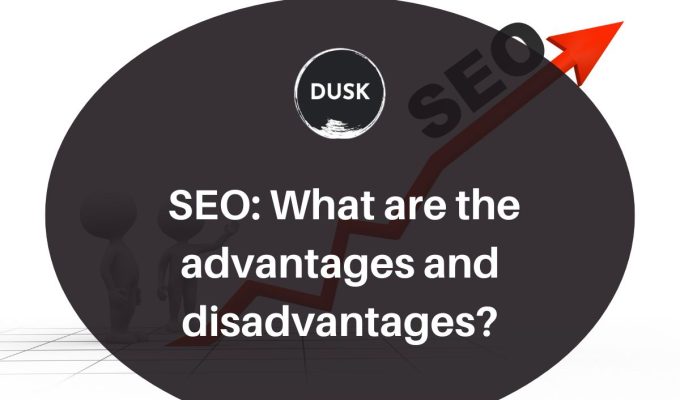SEO is already a relevant channel for many companies. Companies that do not yet use the channel in a targeted manner often ask themselves where the advantages and disadvantages lie. Should I invest in SEO? Or are there also aspects here that can make this channel unattractive?
SEO vs. SEA: Buy vs. Rent
Of course, you can attract visitors via paid search engine entries – keyword: SEA. With Google this is done via Google Ads, with Bing via Bing Ads. It works very well and quickly – but has the clear disadvantage that you have to pay for every click. As soon as the money flow dries up, traffic via this channel also ends.
It’s different with SEO: the traffic is usually sustainable. So here the comparison with “rent vs. buy ”: If you rent an apartment, you pay your contribution every month – or have to leave the apartment. It’s different with property. (Of course, anyone who is a homeowner knows that this calculation does not always work out perfectly.)
One should never forget that SEO also costs money. Only these costs are not as obvious as with SEA. Costs can arise in different places:
Content creation
External agencies
Link purchase
Technical measures (hosting etc.)
Direct allocation of costs
Controlling can answer the question of whether SEO has more advantages or disadvantages in terms of costs: What are the costs for SEO traffic? And what result does the channel deliver?
Unfortunately, this is not always easy. Especially when building links, it can be seen that it can never be said whether the costs X for built links also lead to a certain result. Because: The same result (e.g. an improvement in visibility) could have resulted without these links.
SEA has a clear advantage here: If you ignore problems such as attribution, you have click costs on the expenditure side and what is measured in terms of conversion value on the revenue side. So if you want a clear connection between commitment and results, you should rather rely on SEA. SEO always has the disadvantage that you invest in measures without being able to specifically attribute the result to these measures later.
Speed
In terms of speed, too, the advantage is more on the side of SEA and not necessarily on SEO. Who z. For example, starting a new website will take weeks and months before SEO delivers relevant traffic at all. Google has to crawl the website first. External links must first be discovered and then added. Trust does not arise overnight.
A SEA campaign, however. Theoretically, a paid campaign can go live in a few hours and quickly deliver value added.
Who, however, z. For example, thinking about page speed optimization must first analyze, derive recommendations for action, then have them implemented by an agency – and then just hope that the SEO results also fit. But that won’t happen soon.
Basically, the following always applies: SEO can hardly be used for short, tactical sales measures. Search engine optimization is more about long-term goals.
Advantages through long range
The organic search engine listings still have a considerable reach. Numbers for this are provided by e.g. B. Advanced Web Ranking. Of course, the numbers vary from country to country. And there are also different distributions with regard to desktop and mobile. In fact, you can never infer your own traffic expectations from average distributions.
And yet it is like this: If you have a good organic ranking, you will usually get more traffic from it than from paid listings. The average click-through rate (CTR) for Google Ads is e.g. B. in Wordstream.
Address people the moment they are looking for something
Basically, search engines are more interesting as a traffic channel than some other channels, e.g. B. Display advertising. Because: You can reach people the moment they are actively looking for something. This greatly reduces wastage and at the same time ensures that the visitor does not have to be persuaded to do anything – a clear advantage
In practice, it is often not quite that simple. You may not have to persuade him, but you still have to prevail against competitors. You have to position yourself as the perfect provider and must not set up any hurdles for the conversion (purchase / lead / newsletter signup …).
SEO (like SEA) must also work with other disciplines such as conversion optimization so that not only the traffic is right. Because in the end, SEO is also about making money.
SEO also improves your website for non-SEO
Those who do SEO do more than just help organic search engine ranking. Others can also benefit from the optimization of their own website:
Anyone who does keyword research for their blog creates articles on topics that are proven to be searched. The blog is also attractive for visitors who do not come from search engines, since relevant topics are covered here.
Optimizing page speed can help organic ranking in mobile searches. However, it has also been shown in various studies (e.g. by Portent) that a higher page speed boosts the overall conversion rate.
SEO can also help with aspects such as filter search (facetted search). Which filters do I really need in which categories? Keyword databases can also provide valuable input here.
Conclusion
SEO has clear advantages: SEO ensures better websites. And: With search engine optimization, you can attract valuable and long-term valuable traffic.
But you also have to see the disadvantages: “Short-term” and “SEO” are two words that often don’t go well together. And: SEO is always a little adventure on the cost side and sometimes a “controlling nightmare” because you can’t always attribute the result to previous investments.






